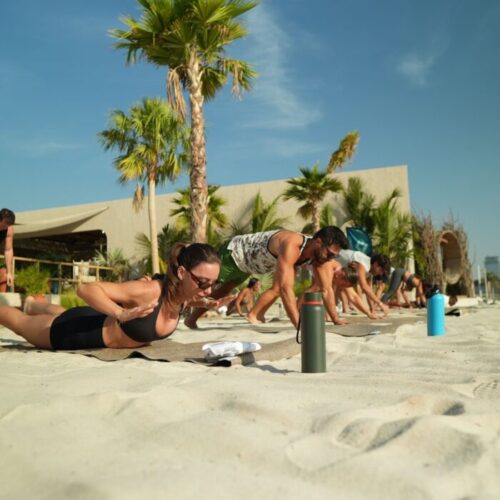How to approach postpartum fitness

We explore the myriad of ways to build up your fitness and physical health safely and gently.
Welcoming a new bundle of joy into the world is undoubtedly one of life’s most beautiful experiences. However, the journey of pregnancy and childbirth can take a toll on a woman’s body, leaving you feeling physically depleted and longing to regain your pre-pregnancy strength and vitality. This is where postpartum fitness comes into play, offering gentle exercises tailored to help new mothers rebuild strength and stamina, in a safe but effective manner.
Understanding postpartum fitness
Postpartum fitness is not about bouncing back to your pre-pregnancy weight overnight or pushing yourself to extremes. Rather, it’s about honouring the incredible changes your body has undergone and gradually reintroducing physical activity to support your recovery. No matter what kind of childbirth you had, it’s essential to consult with your healthcare provider before starting any postpartum exercise regimen to make sure your body is in a good place to begin.
Gentle exercises for strength
Here, we will discuss some great options for women setting out on their journey with postpartum movement.
Pelvic floor exercises
Strengthening your pelvic floor muscles is crucial postpartum, as pregnancy and childbirth can weaken them. Pelvic floor or kegel exercises involve contracting and relaxing the muscles around your pelvic area and are relatively easy to fit into your day as a busy new mother! Start by squeezing the muscles, hold for a few seconds, then release – that’s it! Aim for three sets of ten repetitions throughout the day.
Deep belly breathing
Deep breathing can help activate the deep abdominal muscles, which may have become stretched during pregnancy. To do this, take a yoga mat and lie on your back with your knees bent and feet flat on the floor. Place one hand on your chest and the other on your belly. Inhale deeply through your nose, feeling your belly rise as you breathe in. Exhale slowly through your mouth, drawing your belly button towards your spine. Repeat for 5-10 breaths.
Gentle core exercises
Once cleared by your healthcare provider, you can start incorporating gentle core exercises to strengthen your abdominal muscles. Pelvic tilts, modified planks and leg slides are excellent choices for a recovering new mum. Remember to engage your pelvic floor and avoid any movements that cause you discomfort or strain. Remember, it’s a journey, not a race!
Walking
Walking is a fantastic low-impact exercise that can be easily incorporated into your daily routine with your newborn. Start with short, leisurely walks around your neighbourhood, gradually increasing the duration and intensity as you feel more comfortable. Make sure to wear comfortable, supportive shoes, as your joints and posture need some extra help in the months following pregnancy and childbirth. Not only does walking help improve your cardiovascular health, but it also provides a much-needed mood boost and a dose of fresh air, which can be great daily pillars to help you protect your mental wellbeing in the early stages of motherhood.
Rebuilding stamina
Many new mums want to regain their stamina, not least to meet the demands of parenting a new baby! Here are some proven ways to help you do exactly that, whilst being aware of not overstraining your postpartum body as it heals.
Postnatal yoga
Yoga offers a gentle yet effective way to improve your flexibility, strength and mental wellbeing postpartum. Look for postnatal yoga classes specifically designed for new mothers, focusing on gentle stretches, breathing techniques and relaxation. Many postnatal yoga classes also incorporate baby bonding time, allowing you to practise alongside your little one!
Swimming
Swimming is another excellent low-impact exercise that can help rebuild your previous stamina, without putting strain on your joints as they recover from pregnancy. Whether it’s leisurely laps in the pool or a water aerobics class, swimming provides a full-body workout while offering the buoyancy and support that new mothers often appreciate and need. Many people also find swimming to be an incredibly mindful activity, that allows time in a sensory environment where their subconscious can flow, leading to clearer thinking and a more grounded state of being – both valuable assets in the life of a new parent!
Pilates
Pilates focuses on core strength, flexibility and overall body awareness, making it an ideal choice for postpartum exercise. Look for postnatal Pilates classes or a teacher who is willing to modify traditional Pilates exercises to suit your current fitness level. Pilates can help improve your posture, alleviate any back pain you may be struggling with and enhance your muscle tone without excessive strain.
Interval training
As you progress in your postpartum fitness journey and receive clearance from your doctor to go ahead and workout at the gym, you may consider incorporating interval training into your routine. Interval training alternates between bursts of high-intensity exercise and periods of rest or low-intensity activity, allowing you to gradually build up your endurance and stamina. However, it’s very important to approach workouts like this with caution and always check in with your body if you feel it’s too much too soon.
Four tips for success
No matter which kind of exercises you embark on, there are some general tips that will help you get the most out of your efforts and avoid injuries. Let’s take a look!
Listen to your body
Pay close attention to how your body feels during and after exercise. If something doesn’t seem right or causes pain, always stop and reassess. Honour your body’s signals and don’t just ‘push through’ – in fact, ask for guidance from trainers and healthcare providers, and adjust your workout accordingly.
Stay hydrated
This is a classic piece of advice, but for good reason! Hydration is essential, especially for breastfeeding mothers. So, make sure to drink plenty of water before, during and after exercise to replenish lost fluids and keep your body in an optimal state for recovery.
Prioritise rest
This can be tough when you have a new baby, but it really is a big part of safely exercising! Adequate rest is actually vital for postpartum recovery. Where you can, aim to incorporate periods of rest and relaxation into your daily routine, allowing your body to recover and recharge. Whether this means getting a minder for an hour or two, or intentionally resting while your baby naps, do what works for you!
Ask for support
Don’t hesitate to reach out for help from your partner, family or friends. Having a support system in place as a new mum can make it easier to prioritise self-care and stay motivated on your fitness journey. It takes a village as they say!
Pelvic floor therapy
In addition to incorporating gentle exercises into your postpartum fitness routine, seeking guidance from a pelvic floor therapist can be immensely beneficial. Pelvic floor therapists are healthcare professionals specialised in assessing and treating pelvic floor dysfunction, including issues such as incontinence, pelvic prolapse, pelvic pain and rebuilding pelvic strength. Through personalised assessments and targeted interventions, pelvic floor therapists can help new mothers address any pelvic floor issues that might have arisen during pregnancy or childbirth.
What to expect
During a pelvic floor therapy session, you can expect your therapist to conduct a thorough evaluation of your pelvic floor function, including muscle strength, tone and coordination. Based on their findings, they will develop a tailored treatment plan consisting of exercises, manual therapy techniques and lifestyle modifications to address your specific needs. Pelvic floor therapy may also involve education on proper physical habits, posture correction and other strategies for optimising pelvic floor health.
Benefits
Working with a pelvic floor therapist can empower new mothers to take control of their pelvic health and address any concerns that they may have postpartum. Whether you’re experiencing bladder issues, pelvic pain, or you simply want to look after your pelvic floor function, a pelvic floor therapist can provide you with invaluable insights, wisdom, support and guidance on your journey to recovery and wellness. Don’t hesitate to discuss the option of pelvic floor therapy with your healthcare provider and feel confident in exploring how it can complement your postpartum fitness regimen, to get your physical health to exactly where you want it to be!
Postpartum fitness is a journey of self-care and self-discovery, where new mothers rebuild their bodies’ strength and stamina, while honouring the incredible experience of pregnancy and childbirth. By incorporating gentle movement and listening to your body’s signals, you’ll soon feel the renewed sense of vitality and confidence in your body’s abilities that you deserve to enjoy!
Image Credit: Shutterstock











Comments